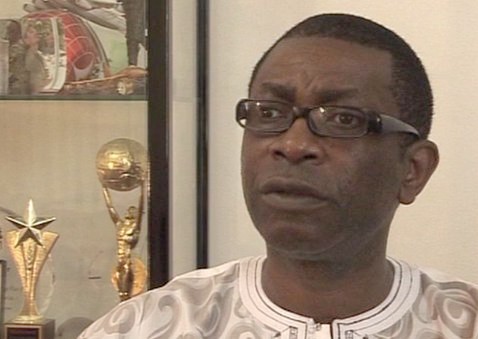Youssou N’Dour feels his candidacy to be Senegal’s president can bring the world’s attention to the West African nation’s election at the end of next month.

“Now people are going to pay attention to this election, which is in danger of not being free and fair,” he says.
His critics say he is running for president to protect his businesses.
The Grammy-award winning singer – the golden saxophone statuette sits in a glass display case in his office – has established himself as a fine entrepreneur.
I used to never allow journalists in my office, but now I have to show the people how I can sit behind a desk,” Mr N’Dour tells the BBC.
Apart from two music studios, and a stake in Senegal’s famous Thiossane nightclub, the musician owns a micro-finance company and above all, an influential media group.
His daily L’Observateur is one of the most read newspapers in Dakar while he has built a strong audience for his radio and TV stations.
“I am new to politics but the people are fed up with career politicians who almost all enriched themselves with the state’s money,” he says.
“My hands are clean,” he adds, as he tries to distinguish himself from a dozen other presidential candidates, including former prime ministers and ministers in President Abdoulaye Wade’s administration.
Mr N’Dour – who has become the icon of the Senegalese self-made-man – strongly believes his management skills will make the difference if he gets the country’s top position.
“I have more than a thousand people working for me, do you think I can’t manage this country?” he asks.
It is the big question – can the Senegalese superstar-turned-businessman, who does not even have a school certificate, rule Senegal?
‘Pretentious’
In the streets of the capital, Dakar, his candidacy gets a mixed reception.
“He’s proven that he’s capable of doing it,” says 25-year-old Moustapha Seck.
Leaning on a wall, he is chatting with his friends in the crowded sea-side neighbourhood of Gueule Tapee.
He adds: “I don’t trust politicians. But Youssou N’Dour, I like him a lot – not just because I love the musician but I mean him as a person.”
A little bit further down the road, Ndengole Ndiaye, in her early 40s, is also enthusiastic.
“We, the women, are very happy that he’s running for president because he’s done so much for our country, he’s invested here.”
Asked whether she would vote for him, she replies: “Of course I will!”
But this is far from being a unanimous reaction.
Djibril Tal, 29, a taxi driver, argues that “music and politics are two different realities”.
“Of course we love him as a singer, but it’s a bit pretentious of him to think he can rule this country,” he says.
Abou Soumare, who intends to vote for the first time next month, gives me the same sort of comment as he makes his way to a local dusty field for evening football training.
“He clearly doesn’t have the political maturity and experience to be a president,” the 19 year old says.
Mr N’Dour, who rose to fame three decades ago, knows it will be up to him to “convince the Senegalese people”.
However, he is confident he can convert his hundreds of thousands of music fans into voters.
Many point to the fact he has never turned his back on his home country. He set up the headquarters of his radio station in the modest area of Medina, where he grew up.
This attachment to his fatherland is of crucial importance to the Senegalese pride.
And he engaged in human rights and humanitarian causes with Amnesty International and the UN Children’s Fund.
Food for all
“He can grab a lot of votes among the marginalised youth who see him as an idol; somebody who made things happen in his life,” says sociologist Djiby Diakhate.
Like the former football player, George Weah, in Liberia -“young people from the poor urban suburbs” will identify with him.
Mr Weah made it to a run-off vote in 2005 after he took the biggest chunk of votes in the first round. But he was then defeated by experienced politician Ellen Johnson Sirleaf, who has since been re-elected in disputed polls.
“Youssou N’Dour must quickly organise a solid campaign team to boost his message if he wants to be a real weight in this open race,” says Mr Diakhate.
“He spoke with honesty when he announced his candidacy, but he didn’t say anything that wasn’t already heard: Promises that are difficult to fulfil.”
Mr N’Dour said he would provide “food for all, better health and education and electricity”.
Asked how he would do that, he said by “scrapping the expensive government’s lifestyle and spending, we can already do a lot”.
“I also believe that I can use my huge contact book to sign new international deals that will bring aid and investments to Senegal.”
But to reach the presidency, Mr N’Dour will have to confront many other candidates, including almost certainly, the incumbent, whose official age of 85 is a constant debate in Senegal.
The constitutional council will rule at this end of this month on whether Mr Wade can run for a third mandate.
The text gives a two-term limit but Mr Wade argues it was changed after he took office so his first mandate does not count.
“He doesn’t have the right to stand again!” repeats Mr N’Dour over and over again.
United opposition?
Once close to the president – he would sing for Mr Wade during official visits – Mr N’Dour fell out with him a few years ago over an article published in his paper.
It alleged that the president’s son, Karim Wade – a top minister in his father’s administration – had been arrested in Paris with a large sum of money.
Karim Wade, who it is believed is being groomed to take over from his father, sued the paper and won.
Since then, the Senegalese president has tried to block the singer’s influence on various occasions – perhaps the most visible example being when he initially refused to grant him a licence to start his TV station in 2010.
The singer then joined the many voices who forced President Wade to withdraw a bill last year that would have effectively scrapped run-off votes in future elections.
“He’s done some good things, but it’s time for him to retire,” Mr N’Dour says with a sigh.
Mr Wade’s intention to change the electoral law sparked unprecedented violence in a country hailed as a democratic example on the continent.
Preventing “the old man” – as the Senegalese commonly call him – from running again is the only issue that unifies opposition candidates. Mr Wade hopes he can capitalise on their division.
However, if he does not win a majority vote in the first round, Mr Wade risks being defeated by an “anyone-but-Wade” coalition, backing the one opposition candidate who makes it to a run-off.
But with the confidence of a polished performer, Mr N’Dour insists he will not need a run-off vote to win this election.
“I will win in the first round,” he said.
“George Weah did a fantastic job in Liberia and made it to the run-off,” he says.
“But I’m not George Weah, I am Youssou N’Dour.”



